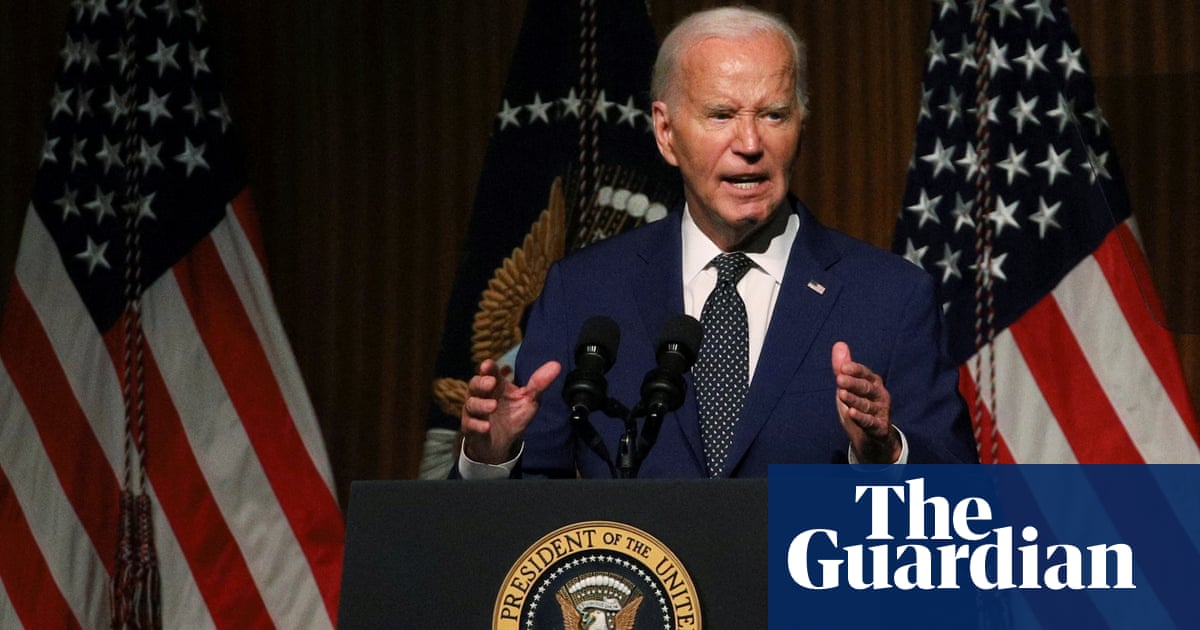Joe Biden, in a Monday address calling for sweeping reforms of the US supreme court, said the recent decision granting some immunity to presidents from criminal prosecution makes them a king before the law.
Speaking in Austin at the commemoration of the 60th anniversary of the passage of the Civil Rights Act, Biden said a president is no longer is restrained by the law and that this is “a fundamentally flawed principle, a dangerous principle”.
The decision in Trump v United States, which gives broad immunity from later prosecution for a president exercising his authority in his official capacity, is one of several recent court rulings – from the gutting of the Voting Rights Act to casting down Roe v Wade as the precedent on abortion rights – that stands in stark contrast to the era 50 years ago in which civil rights legislation passed, Biden said.
“The extreme opinions that the supreme court has handed down have undermined long established civil rights principles and protections,” Biden said, invoking the specter of Project 2025 as a looming threat.
“They’re planning another onslaught attacking civil rights in America,” he said.
“For example, Project 2025 calls for aggressively attacking diversity, equity and inclusion all across all aspects of American life. This extreme Maga movement even proposes to end birthright citizenship. This is how far they’ve come.”
Biden said he is proposing a new constitutional amendment that explicitly applies the criminal code to presidents. The conduct of Donald Trump demand legislative changes, he said.
“No other former president has asked for this kind of immunity and none should have been given it,” Biden said. “The president must be accountable to the law … We are a nation of laws, not kings and dictators.”
A constitutional amendment requires two-thirds of both the US House and Senate to agree to it, followed by the government of three-quarters of the states.
Biden also said that the scandals involving supreme court justices have caused public opinion to question the court’s fairness and independence and impeded its mission.
He said: “The supreme court’s current code of conduct is weak and even more frighteningly voluntary.”
Biden called for a binding code of conduct for the supreme court and term limits for justices, noting that the United States was the only western democracy that gives lifetime appointments to its high court.
The term limiting proposal would create staggered 18-year terms for justices, beginning with the next justice to leave the court.
The idea for term limits and a binding code of ethics for the court is not new but has perhaps become more urgent. Biden’s proposal closely resembles legislation first proposed by Georgia representative Hank Johnson, the ranking Democrat on the House judiciary committee and the likely banner carrier for legislative movement on this issue if he regains the committee chairmanship in a Democratic House.
Johnson’s Term Act would apply term limits to existing supreme court justices, giving each president appointments in the first and third year of their administration.
“Right now, three justices have already served in excess of 18 years,” Johnson said. “And so, those judges would be replaced over a six-year period.”
Johnson described term limiting legislation as “important foundational, structural change that will prevent the court from becoming the kind of court that this one is; one that, because of tenure, has become unaccountable, arrogant, and destructive to our democracy.”
Johnson also has proposed the Supreme Court Ethics, Recusal and Transparency Act, legislation binding supreme court judges ethically.
But what if the court rules that this legislation itself is unconstitutional?
“There would be nothing that would stop them from ruling it unconstitutional,” Johnson said. “But if we get to that point, we could have we would say goodbye to the rule of law in this country.”
Johnson likened the prospect to the reaction of President Andrew Johnson rejecting a supreme court ruling on Native American removals in Georgia nearly two centuries ago, with a federal government effectively ignoring the court. Ruling “something that’s clearly constitutional was unconstitutional would really be the end of our democracy, because there would no longer be respect for the rule of law”, he said.

